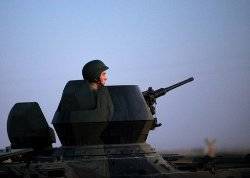Another mortar shell from Syria has struck Turkish territory, prompting a fourth straight day of retaliatory artillery fire from the Turkish side.
The mortar landed in a rural area near the village of Guvecci early on Saturday morning, just minutes after intense fighting broke out between the forces of Syrian president Bashar al-Assad and the opposition forces in the village of Harabjoz, in Syria's Idlib province, the private Dogan news agency reported.
No one was hurt by the mortar, which landed some 500 meters outside of the village. But Turkish artillery based at an army battalion near Guvecci immediately responded with "counter-fire," the state-run Anadolu Agency said.
Villagers rushed out of homes and gathered at a safer point in the village, away from the border area.
The latest shelling comes a day after Turkish prime minister Recep Tayyip Erdogan called on Syria not to test Turkey's "limits and determination" and insisted that his country "was not bluffing" with its warnings.
'Aggressive actions'
This was the second cross-border mortar exchange in as many days. The latest tensions with Syria began Wednesday when a Syrian shell hit a home at a Turkish border town, killing two women and three children and sparked unprecedented artillery strikes by Turkey.
Turkey's parliament on Thursday also voted to allow cross border military operations in Syria, further raising tensions between the neighbors that were once close allies.
On Friday, the US sided with Turkey, condemning what White House spokesman Josh Earnest called the "aggressive actions of the Syrians."
Earnest said Turkey's response was appropriate and that the US stands by Turkey, a NATO ally.
Saturday's shelling came as both sides appeared to be trying to defuse the situation. A Turkish foreign ministry official said on Friday that Syria had pulled tanks and other military equipment away from the border.
Turkey, along with other countries siding with the opposition forces, is averse to intervening militarily, while Assad has also tried to avoid provocations he believes would trigger a foreign intervention.
PHOTO CAPTION
Turkish military stand near the Turkey-Syria border in Akcakale, Turkey, early Friday, Oct. 5, 2012.
Al-Jazeera


 Home
Home Discover Islam
Discover Islam Quran Recitations
Quran Recitations Lectures
Lectures
 Fatwa
Fatwa Articles
Articles Fiqh
Fiqh E-Books
E-Books Boys & Girls
Boys & Girls  Articles
Articles










